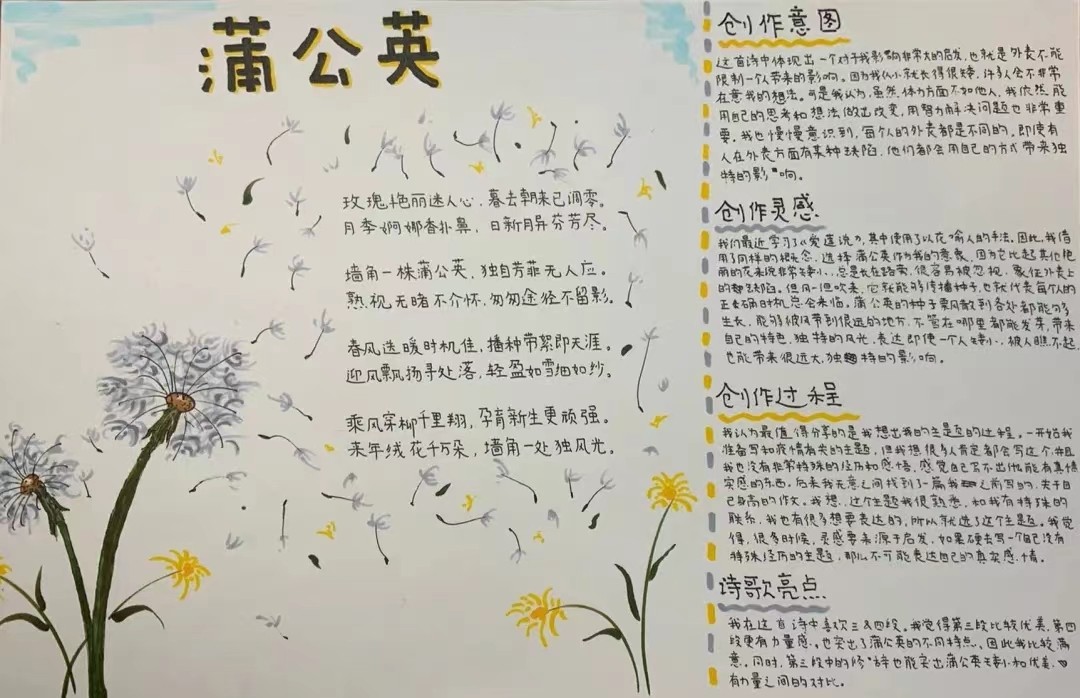During this April unlike any other, Pao School’s Year 7 students studied the unit "Poetry and Prose” in Chinese class. Though Year 7 students are familiar with poetry, they are still building their knowledge and have yet to realise poetry’s unique charm as a form of emotional and philosophical expression. At the same time, with online teaching, teachers must face the challenge of ensuring students are properly engaged during class time and learn the subject matter well.

Y7B Anny
In considering how to face the unique challenges presented by online study, Year 7 Chinese teachers Ms. Lily Chen and Ms. Yaping Hu started by dividing the poetry unit into three parts. First, they gave students an introduction to poetry, in which they wrote and short poem and learned basic poetry expressions such as "I am..." or "I would like to become...". Next, students discussed different poems and recommended their favourites to one another, explaining the reasons they like their chosen poems by using the discussion function of the PowerSchool Learning tool. During this part, they also learnt how to express their feelings using poetry. Finally, the students built upon the skills they had learnt previously by writing a unique poem that reflected their personality.


Writing a poem in class
In this task, the students needed to draw upon both their creative thinking and core poetic composition skills. Though challenging, this exercise helped the students’ growth as poets – especially in the task of matching the high standards of previous work.
Ms. Hu says: "We are interested in the ability of middle school students to understand different texts. Moreover, through the study of language texts, we hope that students can develop their perception of life, alongside their ability to connect with their family, the surrounding environment, and society. Therefore, we use different classroom activities and projects to help them to gain a literary sense and take a poetic eye to daily life.” Due to this, some of the assignments go well beyond standard writing. For example, last semester, students were asked to make a short video on the theme of autumn and recite poetry with music playing simultaneously in the background. “Throughout the unit, I’ve often been amazed by the students’ perceptiveness, imagination, and creativity." Ms. Hu says.
Ms. Chen notes that Year 7 Chinese is a link that connects learning in Year 6 and Year 8, with a focus on applying what students have learned, saying, “Chinese teaching in middle school is a graduate process, aiming to cultivate students' interest in Chinese learning and improve their listening, speaking, reading, and writing skills."
Therefore, Year 6 teaching focuses on appreciation through training students to distinguish the quality and essence of different works. Year 7, meanwhile, focuses on teaching students to apply what they have learned by using texts they are familiar with. Finally, building upon the previous two years of study, the teaching focus turns to discernment in Year 8.
“Cultivating one’s ability to think critically is not something that can be achieved overnight,” Ms. Chen observes. Rather, students naturally develop their literary skills over several years of study.
Beyond this, the Chinese teachers hope that Chinese learning can be highly relevant to the everyday lives of students and can act as a tool for intellectual, aesthetic and moral discovery.
The poetry covered in this unit covers a wide range of topics, such as the students’ perception of everyday life during the pandemic, their philosophies on life, and their plans for the future. The teachers hope that, through the study of poetry, students can boost their creative expression ability and better convey their feelings in poetic verse.
- Lily Chen, Head of Year 7,
Middle School Chinese Teacher